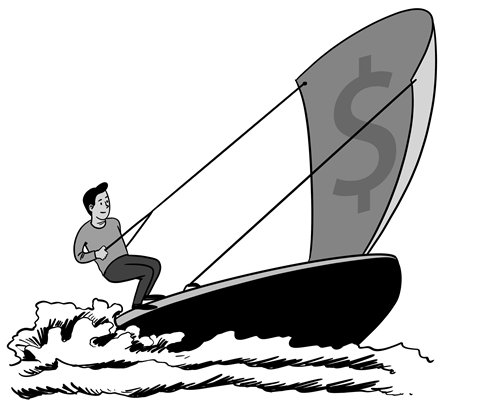HOME >> BUSINESS
China should not pursue ‘de-dollarization’ while global economy roils in turmoil
Source:Global Times Published: 2019/8/7 20:18:40

Illustration: Luo Xuan/GT
China's State Administration of Foreign Exchange recently released a slew of data including the operating performance of foreign exchange reserves and forex composition. As of the end of June, China's foreign exchange reserves reached nearly $3.12 trillion. From 2005 to 2014, the average annual yield of China's foreign exchange reserves was 3.68 percent. Yet, the portion of US dollar-denominated assets in China's reserves portfolio fell from 79 percent in 1995 to 58 percent in 2014, while the portion of non-dollar assets rose from 21 percent in 1995 to 42 percent in 2014. Apparently, China's foreign exchange reserves have shown signs of "de-dollarization," a phenomenon that indicates a shift from US dollar-based assets. Although the diversification of currency composition may be conducive to asset preservation and risk avoidance from the perspective of investment and trade, we believe the "de-dollarization" of foreign exchange reserves may only cause greater risks in the context of intensified trade frictions and global currency turmoil.
Theoretically speaking, the diversification of foreign exchange reserves helps to reduce exchange rate risk. However, the composition of China's foreign exchange reserves is more dispersed compared with the global average level, with the proportion of US dollar-based assets below the international average of 65 percent, which is actually not conducive to the stability of the yuan exchange rate against the dollar. Although "de-dollarization" may reduce the yuan's dependence on the dollar, there is no other currency that can replace the value of the dollar. Major currencies like the euro, the yen and the pound are also facing great risks at present. Since the dollar's share in the international payment system has dropped from 60 percent during the 2008 financial crisis to the current 40 percent or so, with the euro now taking a 35 percent share, maintaining a certain amount of non-dollar reserves is beneficial in trade settlement. However, dollar-denominated assets still hold the dominant position in the international financial market, and the US dollar remains the main currency in international trade and investment. Moreover, with the US capital market going higher, the US dollar index against the six major currencies has been strengthening in recent years. Exchange rates of other major currencies have been declining against the dollar, so "de-dollarization" cannot really decentralize exchange rate risk.
More importantly, maintaining the stability of the yuan is the key to maintaining China's economic stability amid the intensified US-China trade frictions, and foreign exchange reserves should serve as an economic "stabilizer." "Non-dollarized" foreign exchange reserves actually may weaken China's ability to intervene in the yuan's exchange rate against the dollar. Adjusting the composition of foreign exchange reserves is a structural process, meaning that in the event of a crisis in the market, China cannot make immediate adjustment but can only adjust gradually. Thus, it could likely miss the opportunity to intervene in the market, leading to the spread of risk. The core functions of China's foreign exchange reserves are to maintain balance of international payments and exchange rate stability, and to safeguard the country's financial security. It is because of the large amount of US dollar-denominated foreign exchange reserves that China was able to withstand the Asian financial crisis, the subprime mortgage crisis, the European debt crisis and other market challenges. Therefore, under the current circumstances, the US debts held by China cannot be seen as a countermeasure in the trade war, but a "pillar" for stabilizing the yuan exchange rate and the Chinese economy.
In this sense, maintaining exchange rate stability is the primary task of managing foreign exchange reserves, while realizing long-term, steady operating income is only a secondary goal. Investment gain on foreign exchange reserves is a good thing, but overemphasis on gain could be misleading. China has been emphasizing risk prevention as a top priority for its foreign exchange reserves management, adhering to principles of "value preservation and increase" and "no major operational risk event." However, the management of foreign exchange reserves assets is not just about investment risk, it should also focus on various risks in foreign investment and trade, including systemic risk in the financial market and geopolitical risk. These issues cannot be resolved through the "de-dollarization" of foreign exchange reserves.
At present, the global economy is facing increasing downward pressure and is expected to enter a period of turmoil. A decrease in the proportion of US dollar-based assets in China's foreign exchange reserves at this time would lead to greater volatility.
All in all, since the US dollar still has a dominant position in the international economy, China should not "de-dollarize" its foreign exchange reserves simply from the perspectives of investment and value preservation. In the context of growing global economic volatility, authorities should consider the need to guard against financial crisis and currency risk for its foreign exchange reserves management, so as to maintain the stability of the Chinese economy.
The article was compiled based on a report by Beijing-based private strategic think tank Anbound. bizopinion@globaltimes.com.cn
Posted in: EXPERT ASSESSMENT